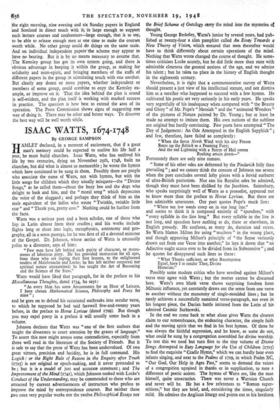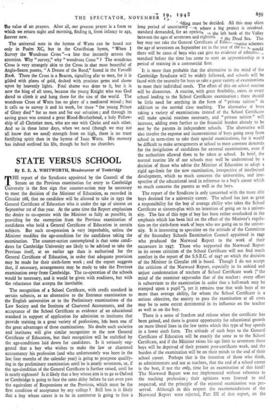ISAAC WATTS , 1674-1748
By GEORGE SAMPSON
HAMLET declared, in a moment of excitement, that if a great man's memory could be expected to outlive his life half a year, he must build churches. Isaac Watts, who has outlived his life by two centuries, dying on November 25th, 1748, built no churches, but did what is almost as memorable ; he wrote the hymns which have continued to be sung in them. Possibly there are people who associate the name of Watts, not with hymns, but with the
little songs for children which they usually misquote—the " Divine Songs," as he called them—about the busy bee and the dogs who delight to bark and bite, and the " moral song" which deprecates the voice of the sluggard ; and perhaps they think of him as the male equivalent of the ladies who wrote "Twinkle, twinkle little star" and "Thank you, pretty cow." Nothing could be further from the facts.
Watts was a serious poet and a born scholar, one of those who lisp in Latin almost from their cradles ; and his works include
flights long or short into logic, metaphysics, astronomy and geo- graphy, all in a sense parerga, for he was first of all a devoted minister
of the Gospel. Dr. Johnson, whose notice of Watts is unusually polite to a dissenter, says of him:
" Few men have left behind such purity of character, or monu- ments of laborious piety. He' has provided instruction for all ages, from those who are lisping their first lessons, to the enlightened readers of Malebranche and Locke; he has left neither corporeal nor spiritual nature unexamined; he has taught the Art of Reasoning and the Science of the Stars."
Watts would have liked that paragraph, for in the preface to his Miscellaneous Thoughts, dated 1734, he says :
" As every Man has some Amusements for an Hour of Leisure, I have chosen Mathematical Science, Philosophy and Poesy for mine " ;
and he goes on to defend his occasional outbreaks into secular verse, to which he supposed he had said farewell five-and-twenty years before, in the preface to Horae Lyricae (dated 1709). But though you may expel poesy in a preface it will usually come back in a volume.
Johnson declares that Watts was " one of the first authors that taught the dissenters to court attention by the graces of language." To assert this now might arouse some contradiction, especially from those well read in the literature of the Society of Friends. But it is safe to say that the prose of Watts has been undervalued. Of two great virtues, precision and lucidity, he is in full command. His
Logick : or the Right Rule of Reason in the Enquiry after Truth (1725) is not original or epoch-making, and it never pretended to be ; but it is a model of just and accurate statement ; and The Improvement of the Mind (1741), which Johnson ranked with Locke's
Conduct of the Understanding, may be commended to those who are attracted by current advertisements of instructors who profess to improve the mind by correspondence courses. But neither these ,two once very popular works nor the twelve Philosophical Essays nor the Brief Scheme of Ontology carry the mind into the mysteries of thought.
Young George Berkeley, Watts's junior by several years, had pub- lished at twenty-four a slim pamphlet called An Essay Towards a New Theory of Vision, which ensured that men thereafter would have to think differently about certain operations of the mind. Nothing that Watts wrote changed the course of thought. He some- times criticises Locke acutely, but he did little more than state with admirable clearness the general notions of the age, and we admire his talent ; but he takes no place in the history of English thought in the eighteenth century.
Nevertheless, it is right that a commemorative survey of Watts should present a just view of his intellectual stature, and not dismiss him as a versifier who happened to succeed with a few hymns. He cultivated his poetic art very seriously in his early years. He speaks very regretfully of his inadequacy when compared with " the Beauty and Glory " of Mr. Pope's " Messiah " and the " animated Wonders " of the pictures of Nature painted by Dr. Young ; but at least he made no attempt to imitate them. His own notions of the sublime are original but hardly convincing. Few poets have attempted " The Day of Judgement : An Ode Attempted in the English Sapphick " ; and few, therefore, have failed so completely : " When the fierce North Wind with his airy Forces Rears up the Baltick to a Foaming Fury;
And the red Lightning with a Storm of Hail comes Rushing amain down—" Fortunately there are only nine stanzas.
" Some of his other odes are deformed by the Pindarick folly then prevailing " ; and we cannot think the censure of Johnson too severe when the poet concludes several lofty pieces with a fervid outburst of ultra-British patriotism. Nor can his Royalist odes be admired, though they must have been disliked by the Jacobites. Saintsbury, who speaks surprisingly well of Watts as a prosodist, appeared not to know more than the preface to Horae Lyricae. But there are less admirable utterances. Our poet quotes Pope's mock line:
" Where ten low words creep on in one long line." and seems to think it is composed entirely of " spondees," with
" every syllable in the line long." But every syllable in the line is not long, and spondees have nothing to do, there or elsewhere, in English prosody. He confuses, as many do, duration and stress. So Watts blames Milton for using " trochees " in the wrong place, and though approving Milton's principle of " the Sense variously drawn out from one Verse into another," he lays it down that "an Adjective ought scarce ever to be divided from its Substantive " ; and he quotes for disapproval such lines as these :
" What Thanks sufficient, or what Recompense Equal, have I to render Thee, Divine Historian."
Possibly some modem critics who have revolted against Milton's verse may agree with Watts ; but the matter cannot be discussed here. Watts's own blank verse shows surprising freedom from Miltonic influence, yet constantly draws out the sense from one verse to another without the monotony of single-moulded lines ; but he rarely achieves a successfully sustained verse-paragraph, not even in his longest piece, the Dacian battle imitated from the Latin of his admired Casimir Sarbiewski.
In the end we come back to what alone gives Watts the clearest claim to our remembrance, the endearing character, the simple faith and the moving spirit that we find in his best hymns. Of these he was always the faithful expression, and he knew, as some do not, what could be sung by a congregation assembled for divine worship. To test this we need but turn first to the tiny volume of Divine Songs Attempted in Easy Language for the LZse of Children (1715) to find the exquisite " Cradle Hymn," which we can hardly hear even infants singing, and next to the Psalms of 1719, in which Psalm XC, " Our God, Our Help in Ages Past," seems to demand the voices of a congregation upraised in thanks or in supplication, to note a difference of poetic =Cent. The hymns of Watts are, like the man himself, quite unsectarian. There was never a Wattsian Church and never will be. He has a few references to " Roman super- stitions," but they are brief, and, considering the times, singularly mild. He admires the Anglican liturgy and points out to his brethren The value of set prayers. After all, our greatest prayer is a form to which we return night and morning, finding it, from infancy to age, forever new.
The universal note in the hymns of Watts can be heard not only in Psalm XC, but in the Crucifixion hymn, " When I Survey the Wondrous Cross "—a line that instantly arrests the attention. Why " survey," why " wondrous Cross " ? The wondrous Cross is very strangely akin to the Cross in that most beautiful of Anglo-Saxon poems, " A Dream of the Rood," found in the Vercelli Book. There the Cross is a Beacon, signalling afar to men, for it is gilded with plates of gold, decked with precious gems and shone upon by heavenly lights. Foul shame was done to it, but it is now the king of all trees, because the young Knight who was God dared to climb it and hang there for the sins of the world. The wondrous Cross of Watts has no glory of a mediaeval missal ; but it calls us to survey it and its work, for there " the young Prince of Glory died" for us men and for our salvation ; and through its saving grace was created a great Blood-Brotherhood, a holy Fellow- ship of all Christian men, who are one with Christ and each other. And so in these latter days, when we need (though we may not all know that we need) strength from on high, there is no truer fortifying spirit than in the hymns of Isaac Watts. His memory has indeed outlived his life, though he built no churches.



































 Previous page
Previous page